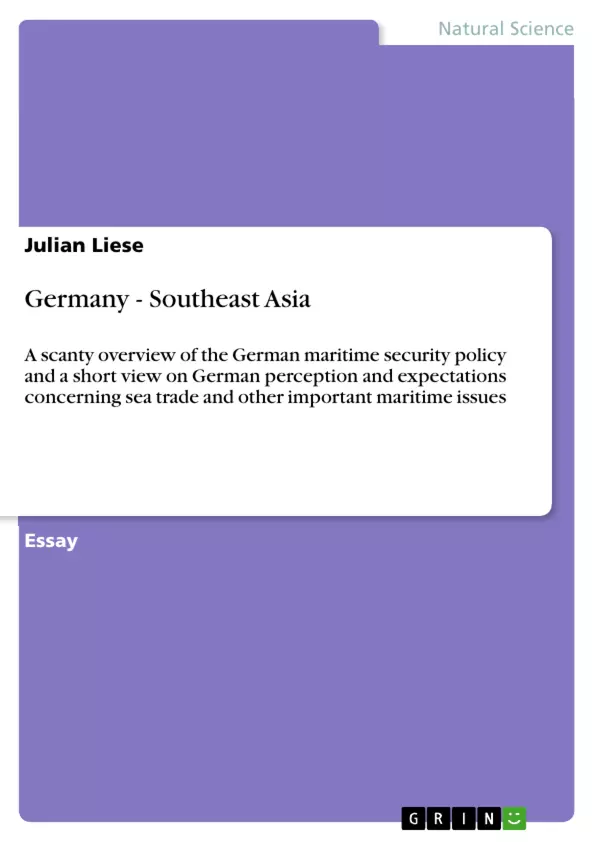This comment shall give an insight into the German perception with regard to its own maritime interests in the Southeast Asian area. First, the objectives of the government will be lighted up. Secondly, military, as well as economic aspects of the maritime domain in Southeast Asia will be discussed. The main focus will lie on the area of the energy production industry, the container transport and India as an ambitious maritime power.
Inhaltsverzeichnis (Table of Contents)
- German security interests within the scope of the European security strategy
- Consequences for a German security policy
- Economical reasons for a glance to the Southeast
- Strategical reasons for a glance to the Southeast
- Sea lanes, energy, trade, piracy and terrorism
- China, India and the problem of upcoming superpowers
Zielsetzung und Themenschwerpunkte (Objectives and Key Themes)
This commentary provides an overview of German maritime interests in Southeast Asia, examining the government's objectives and analyzing the military and economic aspects of the region's maritime domain. The commentary specifically focuses on the energy production industry, container transport, and India's rising maritime power.
- German security interests within the European security strategy
- Consequences for German security policy
- Economic factors influencing German interest in Southeast Asia
- Strategic reasons for German engagement in Southeast Asia
- The importance of maritime security in Southeast Asia, including issues of trade, energy, piracy, and terrorism
Zusammenfassung der Kapitel (Chapter Summaries)
The first chapter outlines Germany's security interests in Southeast Asia, drawing upon the European security strategy and highlighting the importance of protecting German values and interests. The chapter emphasizes Germany's commitment to promoting democracy, rule of law, and free trade, alongside the need to address global challenges such as terrorism and climate change.
The second chapter examines the implications of these interests for German security policy, advocating for more active, timely, and robust responses to regional and global security threats. This chapter underscores the importance of protecting German ships and maritime routes, as well as the need for enhanced legal frameworks to combat piracy and terrorism.
The third chapter delves into the economic motivations for Germany's focus on Southeast Asia, emphasizing the rapid growth of world trade and the shift of the economic center to the region. The chapter highlights the importance of functional transport infrastructure and the advantages of maritime transport in terms of efficiency and environmental impact.
Schlüsselwörter (Keywords)
The key themes and concepts explored in this commentary include German maritime security policy, Southeast Asia, European security strategy, economic globalization, energy production, container transport, India as a rising maritime power, and the challenges of piracy and terrorism.
- Quote paper
- Julian Liese (Author), 2009, Germany - Southeast Asia, Munich, GRIN Verlag, https://www.hausarbeiten.de/document/172658


